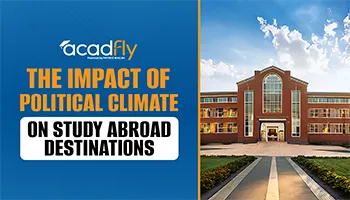


The decision to study abroad is often influenced by a myriad of factors, including academic opportunities, cultural immersion, and personal growth. However, one often overlooked yet significant factor is the political climate of the destination country. The political landscape of a country can have a profound impact on the safety, accessibility, and overall experience of studying abroad. This article explores the various ways in which the political climate can influence study abroad destinations, from student safety to visa regulations, and highlights key considerations for prospective students.
Before delving into the impact of the political climate on study abroad destinations, it's essential to understand what constitutes the political climate of a country. The political climate encompasses various factors, including:
The stability and security of a country are crucial considerations for study abroad students. Political unrest, civil unrest, and conflict can pose significant safety risks and disrupt academic activities.
Government policies and regulations, including visa requirements, immigration laws, and foreign relations, can impact the accessibility and ease of studying abroad in a particular country.
The level of respect for human rights and freedoms, including freedom of speech, expression, and assembly, can affect the overall environment for studying and living abroad.
Perhaps the most immediate and tangible impact of the political climate on study abroad destinations is its effect on student safety and security. Countries experiencing political instability, social unrest, or high crime rates may pose increased risks to students' well-being.
Political factors often influence visa regulations and immigration policies, affecting the ability of international students to study abroad in certain countries. Visa restrictions, lengthy application processes, and changing immigration policies can create barriers for prospective students.
In countries where academic freedom and expression are restricted, students may face limitations on what they can study, research, or discuss openly. Censorship, government surveillance, and restrictions on internet access may hinder academic exploration and intellectual exchange.
Political tensions and conflicts between countries can impact cultural exchange and interaction between students from different nationalities. Visa restrictions, travel bans, and diplomatic disputes may hinder opportunities for cross-cultural learning and collaboration.
The economic stability and cost of living in a country can be influenced by its political climate. Economic instability, currency fluctuations, and inflation may affect the affordability of living and studying abroad for international students.
The diplomatic relations between countries can impact study abroad opportunities through international cooperation agreements, exchange programs, and funding opportunities. Political tensions or strained relations may limit collaboration between universities and institutions.
Before selecting a study abroad destination, prospective students should conduct thorough research on the political climate of the country. This includes monitoring news sources, government travel advisories, and consulting with study abroad advisors.
Prioritize safety and security when choosing a study abroad destination. Consider factors such as crime rates, political stability, healthcare infrastructure, and emergency response protocols.
Familiarize yourself with the visa and immigration requirements of your desired study abroad destination. Be prepared to navigate the application process and comply with any documentation or eligibility criteria.
In light of the unpredictable nature of political events, it's essential for students to maintain flexibility and have contingency plans in place. This may include alternative study abroad options, backup destinations, or arrangements for early departure if necessary.
Seek guidance and support from study abroad advisors, university officials, and relevant authorities when navigating the impact of the political climate on study abroad destinations. They can provide valuable insights, resources, and assistance throughout the planning process.
A study abroad program in Country X was disrupted due to widespread political protests and civil unrest. Concerns about student safety prompted the university to suspend the program and evacuate students back to their home countries.
Changes in visa regulations and immigration policies in Country Y resulted in delays and complications for international students applying to study abroad programs. Many students faced challenges obtaining visas and meeting the new requirements.
Diplomatic tensions between Countries Z and A led to restrictions on travel and exchange programs between universities in the two countries. Study abroad opportunities were limited, and collaborative initiatives were put on hold until relations improved.
The political climate plays a significant role in shaping study abroad destinations, influencing factors such as student safety, visa regulations, academic freedom, and cultural exchange. Prospective students must carefully consider the political landscape of their desired destination and assess potential risks and challenges. By conducting thorough research, prioritizing safety and security, understanding visa requirements, maintaining flexibility, and seeking guidance from relevant authorities, students can navigate the impact of the political climate and make informed decisions about their study abroad experience. Ultimately, studying abroad offers invaluable opportunities for personal and academic growth, but it's essential to be mindful of the political context in which these experiences unfold.
